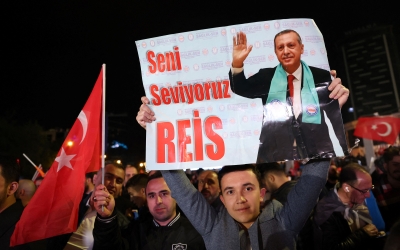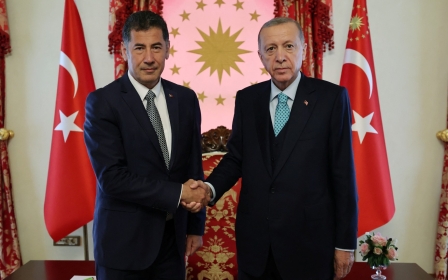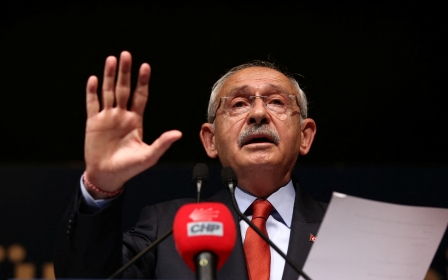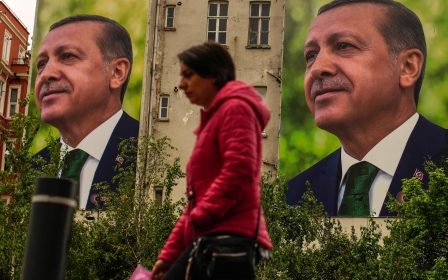Turkey elections: How Erdogan won the first round, and Kilicdaroglu's U-turn
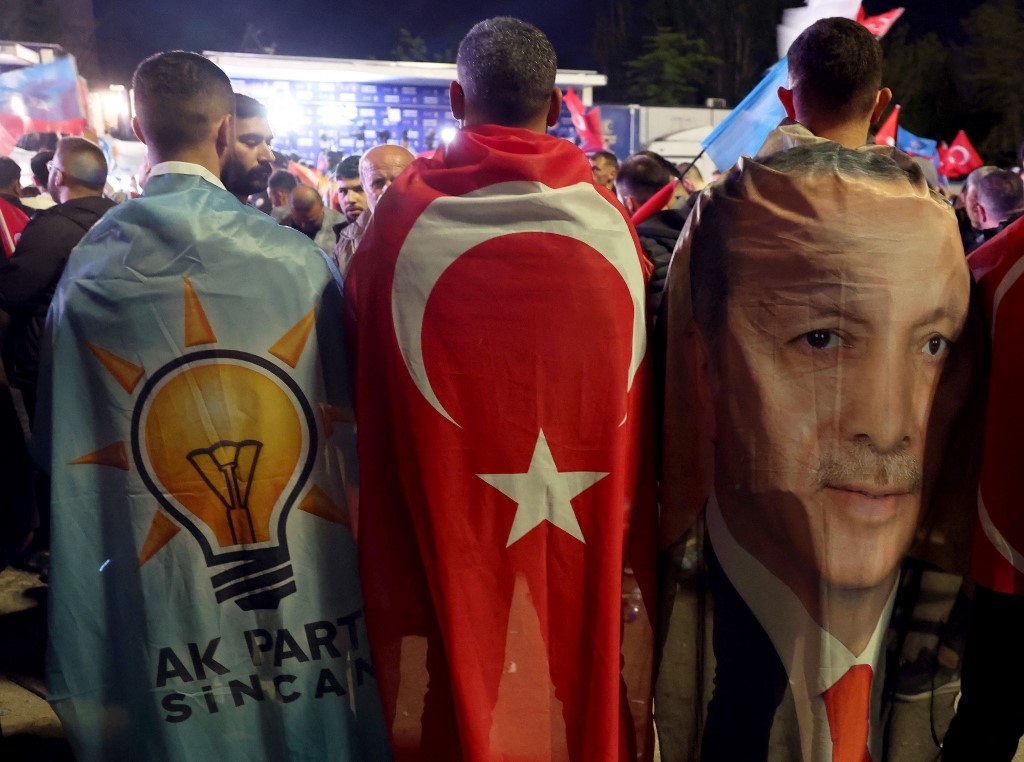
President Recep Tayyip Erdogan will have been taken aback by the results of the first round of Turkish elections, as will much of the opposition.
Unsure of the outcome of Turkey's most competitive elections in two decades, Erdogan had nominated every one of his existing cabinet members as a candidate for the legislative chamber. This was a significant and symbolic move given that, under current rules, ministers are not allowed to be MPs. This move also enabled his party to use public funds, which the ministers commanded.
Before the first round, the governing People's Alliance, led by the ruling Justice and Development Party (AKP), mounted a three-pronged campaign.
Firstly, there was a huge increase in public spending. Two-and-a-half million individuals received early retirement benefits, all households received natural gas at no cost for a month, and the minimum wage - which covers the wages of 60 percent of the employed - saw significant rises.
This exorbitant public spending enhanced Erdogan's prospects of winning. It also all but ensured that the opposition would have enormous difficulties fixing the economy if they ever won.
New MEE newsletter: Jerusalem Dispatch
Sign up to get the latest insights and analysis on Israel-Palestine, alongside Turkey Unpacked and other MEE newsletters
Of course, should Erdogan win re-election, he would also face the same calamitous economic conditions.
The structural crisis afflicting Turkey's economy had intensified over the last six months, as the cost of the government’s electioneering and the devastating earthquake drained the remaining public finances.
Secular-conservative split
Erdogan's second strategy has been to polarise society further over the secular-conservative split.
However, this is no longer the same cleavage that brought Erdogan to power at the beginning of the 2000s. Back then, it referred to religious freedoms and a re-interpretation of secularism. But in the last decade, it has divided the public over conservative values, such as family, women’s role in society, and LGBTQ rights. In a way, Erdogan had successfully adopted the agenda of the global far-right.
But more crucially, in order to try and win the election, Erdogan used the nationalist card and stigmatised the collaboration of the oppositional coalition, the Nation Alliance, with the pro-Kurdish political party, depicting it and opposition candidate Kemal Kilicdaroglu as enablers of terrorists.
He underlined the necessity for strong leadership to maintain the country's unity and promised stability. He appealed to the electorate’s aspirations for status and power for Turkey on the international stage.
Finally, rekindling the emotional bond that exists between them, Erdogan asked his constituents to remain loyal to him and support him in this critical battle. In keeping with the symbolic universe of the Ottoman sultans, who visited Hagia Sophia mosque before their historic battles, he prayed with his constituents there the day before the elections.
This held significance for Erdogan’s supporters and was well received. Despite the difficult situation Turkey finds itself in, Erdogan's support, which was around 52 percent in 2018, only fell to 49.5 percent in these elections, representing only a modest loss for him personally.
The AKP, however, suffered its worst vote loss in 20 years. Supporters of the AKP would rather punish the party than its leader.
Kilicdaroglu's leadership style
Erdogan’s charismatic leadership has become an essential feature of Turkey’s current regime, with him seen simultaneously as both one of the people and transcendent of the people.
He is perceived as having outstanding leadership qualities, yet is fallible, can be vulnerable, and needs support from “his people” in critical times.
Kilicdaroglu's leadership style is almost the opposite of Erdogan's. Rather than speaking personally to the voters, greeting and embracing them on the streets, and binding them emotionally as Erdogan does, Kilicdaroglu offers voters consensus-building leadership with promises to bring back effective institutions.
The opposition felt certain that no matter who its candidate was, the anti-Erdogan bloc would be so powerful that electoral victory was assured
In a country where norms of masculinity are associated with leadership, he filmed a significant portion of his campaign messages from the kitchen of his home and relayed a message of hope and tolerance.
However, there were many obstacles to the success of this strategy. For one thing, escaping from the grip of charismatic leadership, characterised by strong emotional bonds and voluntarism, is not easy. It gets even more difficult if the charismatic leader has had a tenure of two decades.
Turkey's institutions have been dismantled under Erdogan's rule and their functioning tied to one person's will. When public confidence in institutions is at an all-time low, a promise for institutional transformation through a dispersed coalition without a strong leader failed to generate a great deal of trust among voters.
During the years Erdogan was consolidating his authority, Kilicdaroglu was the head of the largest opposition party. He has played the lead villain role in all of Erdogan’s speeches that pumped negative partisanship against him. It was untenable for the AKP constituents to defect in large numbers in a nation where negative partisanship shapes voting behaviour.
Finally, of course, nationalism played a role, with nationalism not just being an idea, but a habitus. It is performed continually at every moment through an individual's words, symbols and body language.
Kilicdaroglu has a more inclusive approach to the question of national belonging, cherished by many, yet created a nationalist deficit within his coalition. This deficit intensified when the representative of the nationalist electorate in the Nation Alliance, the Good Party, left the table over the issue of Kilicdaroglu’s candidacy, which they strenuously opposed but then came back after much negotiation.
Free but unfair elections
Turkey had free but unfair elections. This is a fact. The government had the tools at its disposal to rearrange the rules of the game at any moment, and the electoral field was open to enormous government intervention and design. Numerous instances of ballot stuffing and problems with vote counting were reported, as with previous elections.
Yet the opposition, after 20 years of Erdogan’s rule and given the enormous problems the country faced, was convinced these elections could be won, to the extent that it relaxed, while coordination of direction and policy became more difficult.
Strong leadership skills and the capacity to appeal to a broad audience were no longer seen as crucial factors in the selection of the candidate. The opposition felt certain that no matter who its candidate was, the anti-Erdogan bloc would be so powerful that electoral victory was assured.
The rivalry within the opposition, however, was further intensified as the chances of winning seemed to increase. This also changed the focus of the coordination from establishing a pro-democracy coalition to how the post-Erdogan era would be structured.
Deeply held worries about voting and the vote tally, as well as significant resentment among the oppositional electorate over the nationalist and secular deficit inside the Nation Alliance, were disregarded.
'I am here'
The opposition coalition, which did not win a majority in the legislature, trails Erdogan by 4.5 points going into the second round.
This outcome has exacerbated the coalition's divides and disheartened the oppositional electorate, which was hoping at least to come ahead in the presidential contest.
Facing defeat, Kilicdaroglu has changed his style completely. He said "I am here", while beating his palm on the table in his post-election debut video.

Moreover, he met with the third-placed candidate, Sinan Ogan of the ultranationalist Ancestral Alliance, who is known for his anti-immigrant and nationalist appeal and scored 5.2 percent in the presidential tally.
On Monday, however, Ogan announced his endorsement for Erdogan in the run-offs. Yet it is not clear whether his secular and anti-Erdogan supporters will follow his lead
Kilicdaroglu’s campaign messages now focus more on nationalism and anti-immigration, a dramatic contrast to his first-round campaign.
It's still anyone's game in round two. Yet this abrupt change in campaign rhetoric may cause greater rifts among opposition voters, who may not see it as a genuine shift.
This new approach also runs the risk of alienating the more democratic components within the oppositional bloc as well as Kurds. Furthermore, the turnout rate may not be as high among disheartened opposition voters, adding to the difficulties of Kilicdaroglu’s candidacy.
Yet the government coalition’s victory in the first round may also reduce its side’s motivation for a higher turnout. And we still don’t know for whom voters who have grown disillusioned with both the incumbents and the opposition will cast their vote.
Ultimately, the Turkish polls have shown us that winning elections does not rely on a mathematical formula, calculating the presumptive votes of diverse groups.
A cohesive strategy and a sincere political narrative that unites the many identities and interests of the voters - sometimes even those that exist inside a single person - are necessary for a winning formula.
The views expressed in this article belong to the author and do not necessarily reflect the editorial policy of Middle East Eye.
Middle East Eye delivers independent and unrivalled coverage and analysis of the Middle East, North Africa and beyond. To learn more about republishing this content and the associated fees, please fill out this form. More about MEE can be found here.



